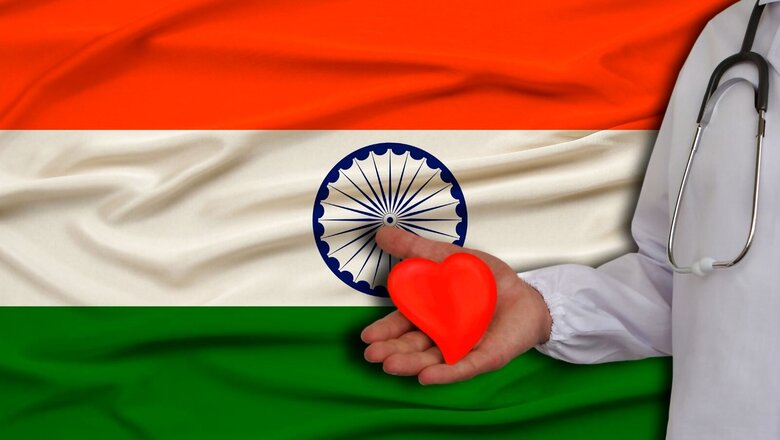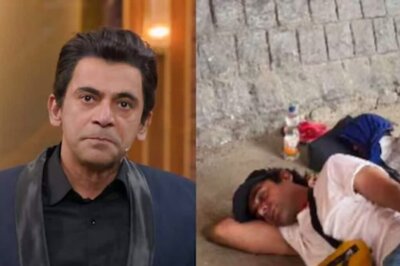
views
Singer KK, Kannada superstar Puneeth Rajkumar, TV actor Sidharth Shukla and comedian Raju Srivastava — the one thread binding all these celebrities is that they lost their lives to cardiac arrests or heart attacks at a young age.
This World Heart Day, the conversation over the increasing incidence of heart ailments and cardiac arrests has gained momentum, especially when young adults have become more prone to the illness.
Multiple factors, including stress, lack of physical activity, high sugar and salt consumption, high consumption of fat content in diet, lack of a heart-healthy diet accompanied by genetic makeup of Indians make us more prone to falling prey to heart diseases.
According to the World Health Organisation, India accounts for at least one-fifth of the 1.79 crore cardiovascular disease-related deaths globally, especially in the younger generation. This means more than 35 lakh deaths due to heart ailments take place in India.
While there is no concrete data to prove that young adults are becoming more prone to heart diseases, some studies suggest a spike in cases triggered by the Covid-19 outbreak.
“There is at least two- to three-fold increase in young patients at my outpatient department,” Dr Hemant Madan, director, cardiology and paediatric cardiology at Narayana Superspeciality Hospital, Gurugram, told News18.com.
Madan said he had also been noticing at least two to three times increase in cases of cardiac arrest or heart attacks in a month compared to five years ago.
According to Dr LK Jha, associate director of cardiology at Faridabad-based Sarvodaya Hospital, “We have seen an increase of 30 per cent over the last five years in the number of young patients coming to the hospital due to a heart attack. They are also showing up with more extensive heart complications with multiple blockages.”
Covid-19 and heart ailments
A large global study published in peer-reviewed medical journal The Lancet advised that people with a history of Covid-19 should pay attention to their cardiovascular health.
The study found that the risk of developing heart ailments is “substantially” higher among Covid-19 survivors than those with no history of the infection.
The study noted that the impact of Covid-19 on cardio-related outcomes appeared to be more pronounced in in-patients (who were admitted to the hospital for treatment due to the infection) than in out-patients.
It concluded that “the 12-month risk of incidental cardiovascular diseases is substantially higher in the Covid-19 survivors than the non-Covid-19 controls”.
Cardiologists in India echoed similar observations.
In a study published by cardiologists at NCR-based Sarvodaya Hospital, doctors have reported seeing a significant surge in cases of heart attack and heart failure in the post-Covid period. “Their incidence has gone up by more than one-fourth in the last year,” the press release had said.
“After the pandemic, the incidence of heart attacks and heart failure has increased by 25-30% in people who got infected with Covid-19. Patients who had to be hospitalised or put on ventilators due to Covid-19 are now much more vulnerable to heart complications and we are seeing a considerable surge in such cases,” Dr Jha said.
Doctors believe that there are two ways by which Covid-19 affects the heart. First is a direct infection of the heart muscle due to which it gets weakened, leading to heart failure. The second is that after Covid-19, a mild form of the infection persists in the body for many months. The arteries remain inflamed, leading to the tendency of clotting inside the heart. This results in heart attack and other complications. “Many incidents have come to light in recent months of a sudden heart attack in people after doing vigorous exercise. In these cases, the heart muscle may still be inflamed due to long Covid-19, triggering a heart attack,” Jha said.
What signs should one spot before a cardiac arrest or heart attack?
According to Dr Anand Kumar Pandey, director and senior consultant-cardiology at Delhi-based Dharamshila Narayana Superspeciality Hospital, there is a strong link between excess sweating and cardiac arrest.
Excessive sweating can be a clear sign of a heart attack, especially if the person leads a desk-bound lifestyle. At the time of a heart attack, your heart slows down and it becomes difficult to circulate blood through the body. This happens when the coronary artery gets blocked, which breaks down the supply of oxygen-rich blood to your heart muscle. Therefore, the body uses extra energy to pump blood and cool itself down, which makes you sweat.
“Sweating more than usual days, especially when you aren’t doing exercise or being inactive, can be an early warning alert of heart diseases,” Pandey said.
How to adopt a healthy lifestyle?
There are many reasons — including some conventional and non-conventional causes — leading to heart ailments. Poor diet, lack of exercise, smoking, high cholesterol, high incidence of diabetes and blood pressure among young people are the conventional causes.
Among the non-conventional causes are extreme exercise, environmental pollution, job stress and recovery from Covid-19.
One should avoid smoking or use of tobacco apart from doing at least 30-60 minutes of activity daily. People must eat a heart-healthy diet such as the consumption of Omega 3 and Omega 6 along with Vitamin D and maintain a healthy weight.
Managing stress levels and getting regular health screenings done to understand the exact lipid profile status will play an important role in diagnosing heart ailments at earlier stages.
Doctors advise that one should not ignore any kind of symptoms, especially pain in the chest or upper part of the stomach. “If you do activities like brisk walking or climbing the stairs and feel any kind of stiffness or heaviness in the chest, you should be very mindful,” Jha said.
Many people attribute heart-related symptoms to acidity or arthritis, but any gastritis that persists for 2-3 days is unusual. It is important in these cases to get tests done to rule out heart problems.
Diabetes and tobacco are the top two risk factors for heart disease in India. “Diabetic people have three times higher chances of having a heart attack than non-diabetic individuals. Smoking is also very dangerous for the heart, due to which we are seeing many young patients of a heart attack.”
Read all the Latest News India and Breaking News here

















Comments
0 comment